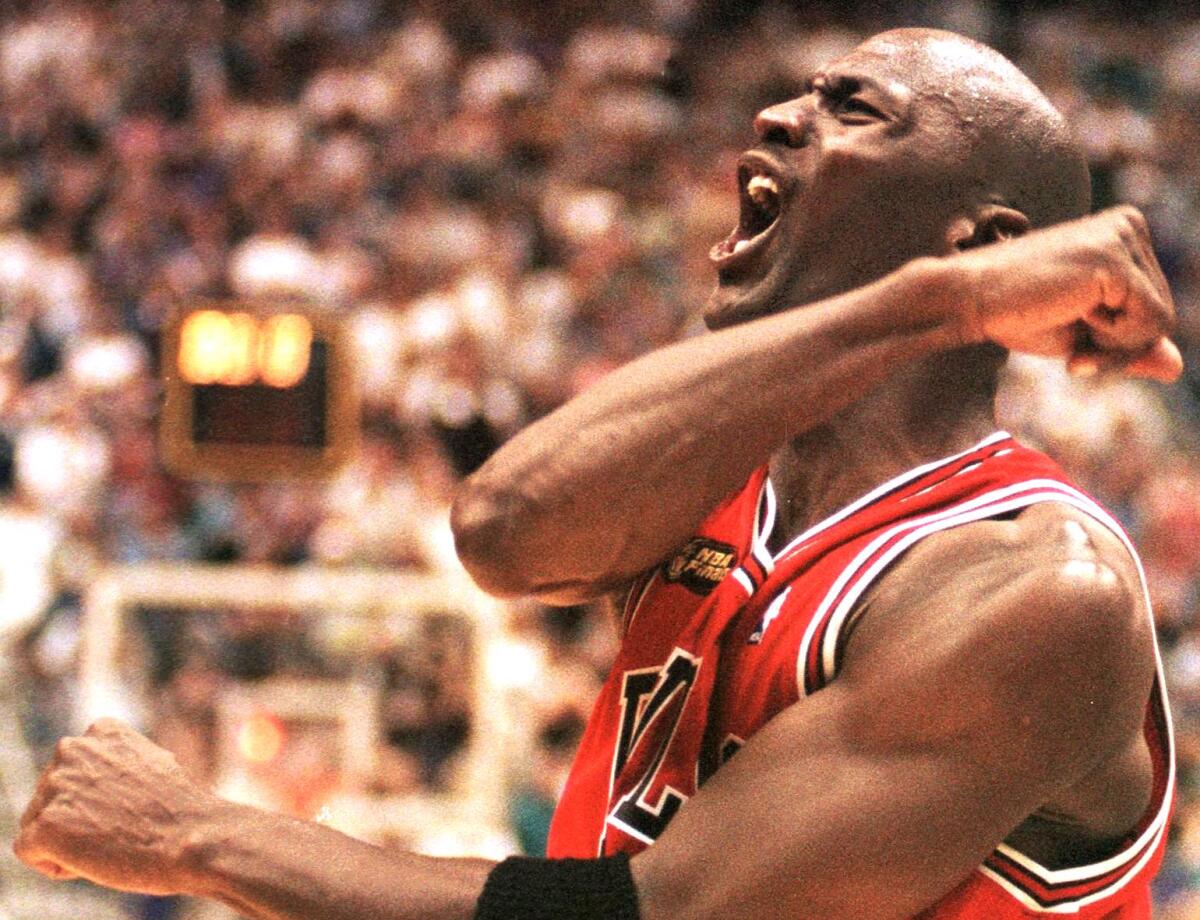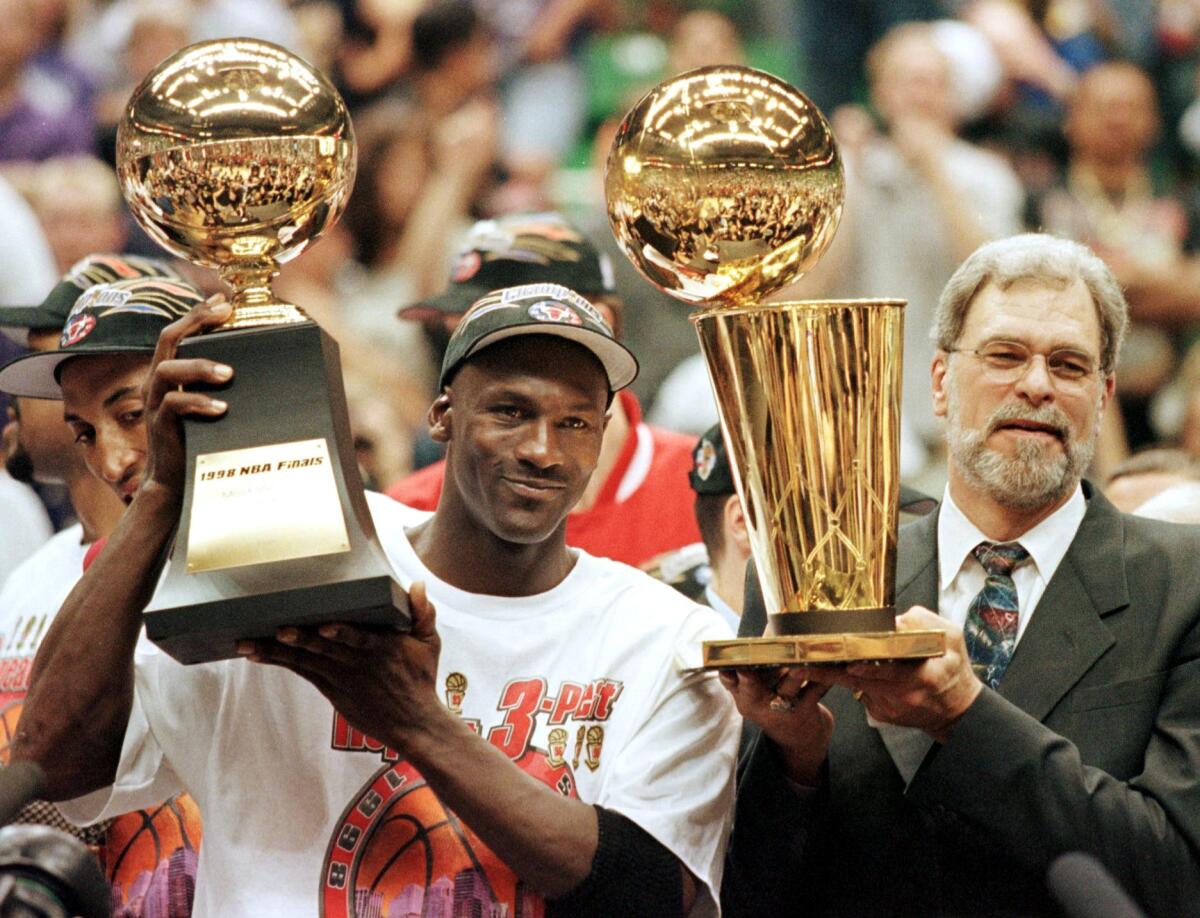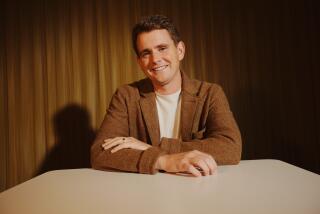Commentary: Michael Jordan docuseries âThe Last Danceâ is more than a TV show. Itâs a cultural event

In 1998, on the home stretch of his sitcomâs final season, Jerry Seinfeld submitted to a courtside interview about the eraâs premier sporting dynasty.
âThe similarity between âSeinfeldâ and the Bulls?â he repeats for the camera, before heading to the locker room to greet the gameâs star, Michael Jordan. âThe show of the â90s, the team of the â90s.â
By the time spring turned to summer, his comparison would be borne out: Love it or hate it, the series finale of âSeinfeldâ became an epochal TV event (76.3 million total viewers), and Jordan led Chicago to its sixth NBA championship in eight seasons before retiring, not for the last time, at age 35.
While itâs the latter that forms the backbone of Jason Hehirâs extraordinary new docuseries âThe Last Danceâ â a co-production of ESPN, the worldwide leader in sports, and Netflix, the worldwide leader in just about everything else â itâs the seriesâ attention to Jordanâs place in the broader cultural firmament that suggests its ambition, and its achievement.
Woven from archival video, in-depth interviews with Jordan and his contemporaries, and never-before-seen footage shot by a camera crew embedded with the Bulls for the 1997-98 NBA season, âThe Last Danceâ jumps between the basketball dynastyâs farewell tour and the arc of Jordanâs remarkable career, with detours into the lives of teammates Scottie Pippen and Dennis Rodman and coach Phil Jackson.
In the process, its multi-layered treatment of what sportscaster Bob Costas calls âone of the most consequential teams in American sportsâ emerges as the latest in a line of TV series, fiction and non-, to reconsider that decade and its defining figures: the post-Cold War, pre-9/11 period in American life that was the monocultureâs last dance too.
Live sports are on hold until the threat of the virus outbreak has passed. So we asked a sports fan to recommend TV shows that provide a sports fix.
It seems at once a cruel caprice and an eerie reminiscence, then, for the 10-part, five-week event to arrive at a moment marked by the shared experience of the COVID-19 pandemic, in which the vast majority of us are staying home to halt the spread of the coronavirus and the world of sports is in suspended animation. When the first two episodes of âThe Last Danceâ premiere on Sunday, they will of course compete with other new TV shows, streaming movies, video games, beloved albums, countless books, not to mention TikTok dance challenges, stress baking, doomscrolling, sex. But for the diehard (and fair-weather) sports fans missing March Madness, The Masters and Major League Baseballâs opening day, the series may feel like manna from heaven: For the time being, âThe Last Danceâ is one of the only games in town.
For anyone capable of feeling a flutter at what one thickly accented Chicago fan calls Jordanâs âpoetry in motion,â thereâs no shortage of fodder. In the absence of postseason fever, âThe Last Danceâ employs the starâs on-court fireworks to approximate the playoffsâ particular intensity â with his outrageous, record-setting 63 points against the â86 Boston Celtics, for instance, or with the buzzer-beater known as âThe Shotâ against the â89 Cleveland Cavaliers.

But the series â reliant as it is on the âSportsCenterâ segments and Finals broadcasts of yore â is as much about the media landscape Jordan swept into as his athleticism or competitive drive. Even its rendering of the locker-room drama swirling around the â97-98 season has a familiar tabloid feel, like a purloined special of âInside Editionâ in which the Bulls come to reflect the tropes of fiction: the epochal hero, his trusty sidekick, the misunderstood rebel, their inscrutable sage. (Thereâs even a villain of sorts in general manager Jerry Krause, though he is the most underdeveloped, and thus unsatisfying, of the central figures. Krause died in 2017.)
Hehir and company lean into this angle from the outset, with an operatic score and a title sequence that emphasizes âback-stabbingâ over points and rebounds; to wit, one of the most compelling subplots in âThe Last Danceâ is the bitter rivalry between the Bulls and the Detroit Pistons, which can be understood even if your primary point of reference is Sharks versus Jets. For every comparison of Jordan to Babe Ruth or Muhammad Ali, there is another to Oprah Winfrey, Barack Obama, the Beatles, the pope. McDonaldâs sponsors an international basketball exhibition in Paris. Spike Lee appears as Mars Blackmon to promote Nikeâs Air Jordans. Gatorade commands us to âBe Like Mike.â
We polled more than 40 TV critics and journalists, inside and outside The Times, on the best TV show to binge while stuck at home.
âIt was the first time that sports were being sold in a cultural way,â NBA commissioner Adam Silver says of The Dream Teamâs dominant performance at the 1992 Olympics, comparing the U.S. export of sports to that of fashion or music. âYou were selling Americana.â
And what is modern Americana if not salesmanship itself? As I once wrote of Jordanâs friend and fellow sports icon Tiger Woods, our nostalgia for the monocultureâs mid-â90s zenith â in which a sitcomâs finale could attract fully one quarter of the U.S. population, and Game 6 of the NBA Finals more than one-tenth â cuts both ways. One personâs âfractureâ or âfragmentationâ is anotherâs hard-won time to shine.
âThe Last Danceâ trades on this nostalgia, and given the strange, fraught moment of its debut, may do more than that: It is not only an ode to the years in which âeveryone knew Michael Jordan,â as journalist Willow Bay says in the series, but also an attempt to recapture their magic. As such, while Hehirâs vision is not terribly sophisticated when it comes to race or politics or the long arc of social history, it is extraordinarily perceptive about celebrity â what makes it, what breaks it, what shapes its character and magnitude. Without downplaying Jordan and his teammatesâ remarkable prowess, the series tacitly acknowledges that fame, even in sports, is a function of framing, of timing â that what the show of the â90s and the team of the â90s had in common, as Seinfeld intuited, was first and foremost the â90s.
The nature of change means the phenomenon of Michael Jordan and the Chicago Bulls, like that of the âSeinfeldâ finale, is unlikely ever to be replicated. But it can be relived, or at least revisited, in the cultural time machine of âThe Last Dance.â
More to Read
The complete guide to home viewing
Get Screen Gab for everything about the TV shows and streaming movies everyoneâs talking about.
You may occasionally receive promotional content from the Los Angeles Times.







